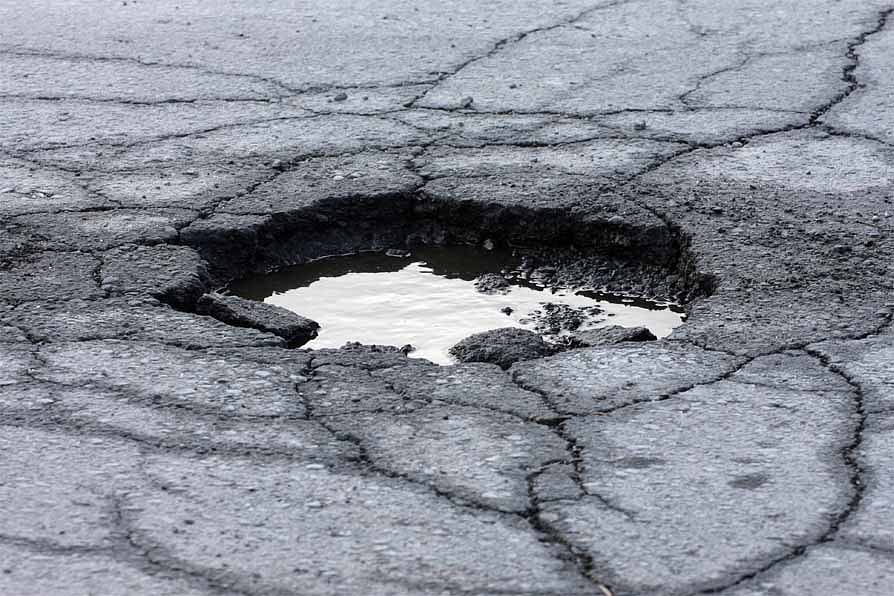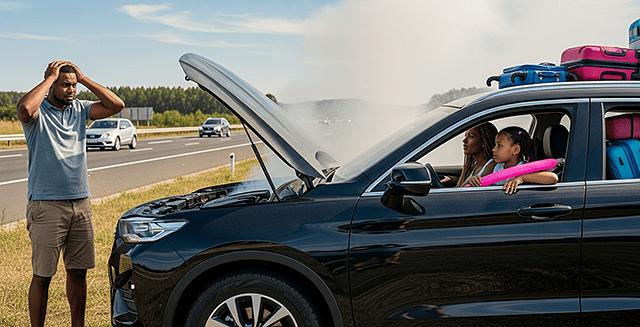Knowledge Hub

POTHOLE CLAIMS ARE MOUNTING
Potholes - a common sign that a road is deteriorating – are widespread throughout South Africa. According to the South African Roads Federation (SARF), South Africa is home to 25 million potholes, 10 million more than there were five years ago.
This year, Dialdirect have noted a 15% increase in pothole related accident claims compared to last year and a 9% increase in tyre damage claims that are as a direct result of a pothole. In 76% of these claims, the pothole damage was so severe, it rendered the car undriveable
In South Africa, the majority of pothole-related claims come from the cities of Pietermaritzburg (21%), Pretoria (20%), Potchefstroom (17%), Bloemfontein (15%), Johannesburg (14%) and Durban (13%). Most of these pothole-related claims are logged from incidents that occurred during off-peak traffic times, when motorists tend to drive a bit faster.
“Dodging potholes has fast become a professional sport but doing so can, and sometimes does, result in car accidents. Even if hitting a pothole doesn’t cause an accident, the damage is immense. One bad patch of road could lead to punctures, tyre bulges, bad wheel alignment and balancing, uneven tyre wear, cracked rims, damaged undercarriage, damaged tyre walls and blowouts,” says Anneli Retief, Head of Dialdirect Insurance.
Traditionally, if a motorist sustains damage to their car after driving over a pothole, they could seek compensation directly from either the South African National Roads Agency (SANRAL) or their local road agency, depending on which road they were driving on at the time of the incident.
“Each road agency has their own procedure and if, for some reason, you have claimed from the wrong agency or failed to submit the right information, your case could be rejected or delayed. In response to the time it takes to claim for pothole damage from road agencies, and the pothole issue at large, Dialdirect has included dedicated Pothole Insurance within its tyre and rim product, which covers accidental damage/loss caused by uneven road surfaces and potholes.
“Although our jointly sponsored pothole fixing initiative in Johannesburg, the Pothole Patrol, is making a considerable dent in ridding Johannesburg of potholes, more needs to be done to protect motorists and fill the gap in other provinces,” says Retief.
Dialdirect provides the following guidelines for navigating poorly maintained roads:
Your car:
- Proactive maintenance: Make sure that your car is checked and serviced regularly. A vehicle that is 100% ready to light up, steer around or meet challenging road surfaces are the best first line of defence.
- On spec: Make sure that the wheels and tyres that you fit match the manufacturer’s specification and that tyres are properly inflated to create an adequate cushion between the vehicle’s rims and the road surface.
- Profile carefully: Low profile tyres may give a vehicle a sportier look, but reduce the space between the rim and the road surface. Fit tyres that are in the “Goldilocks zone” between being sporty, offering comfort and protecting against rough road surfaces. Ideally opt for tyres with rim protectors.
- Emergency kit: Make sure that your vehicle is equipped with the basic wheel changing tools and safety equipment.
Your driving:
- Alert & aware: Always be fully aware of your surroundings, including road signs and technology that alert you to hazards.
- Heavy loads, rough roads: Be careful when using a road or lane used by heavy motor vehicles, as these typically deteriorate faster.
- Cuts like a knife: Be wary of steep road shoulders and surfaces with sharp debris, especially where they can damage the less robust side wall of a tyre.
- Slow it down: Reducing speed could give you vital time to react to obstacles and other vehicles making sudden movements.
- Undercover threats: When it rains, water could easily hide a pothole or debris. The same goes for roads that are badly lit. Slow down and be extra cautious.
- Brake and steer smart: If you can’t avoid hitting a pothole or bad road surface, apply the brakes before the hazard, but let up as you’re about to make contact. This helps to limit damage and also reduces the risk of losing control of the vehicle. Keep a firm grip of the steering wheel and avoid making excessive steering changes.
In the event of an incident or accident:
- Don’t assume that it’s just a minor damage. Stop when it is safe to do so to make sure.
- Switch on your hazard lights and, if possible and legal, pull into the emergency lane.
- Make sure that your vehicle remains visible – make use of your emergency triangle.
- Call emergency services and your insurer for assistance.
Dialdirect is a licensed non-life insurer & FSP. Ts&Cs on

We Have Great
Insurance Products
Need car, home & Life Insurance? We offer a wide range of insurance products. Switch & get cash back on insurance premiums.
Related blogs

General News
5 quick insurance wins for young professionals

General News
Spring Back Into Socializing: 10 Etiquette Rules for Post-Hibernation Gatherings





